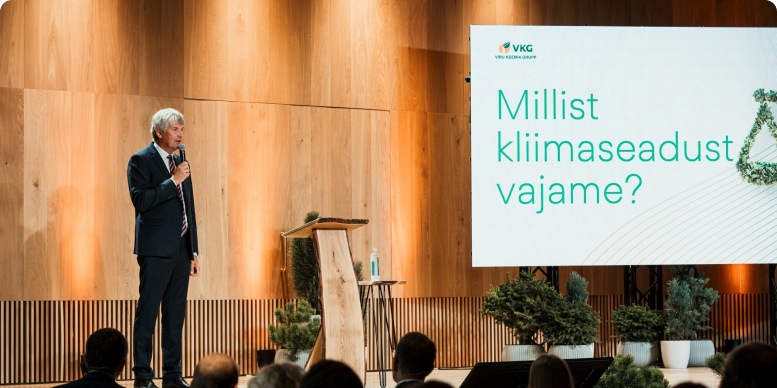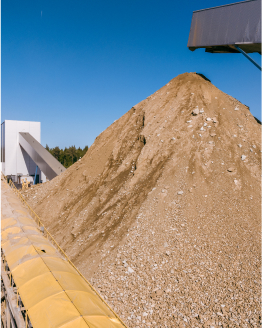Regulative framework
The year 2023 was characterised by a very volatile regulatory environment, mainly due to the parliamentary elections in March. One of the main objectives of the new government was to implement the Green Transition in Estonia, often with the ends justifying the means. When the state needed additional revenue for the budget, environmental taxes were raised in such a way that stakeholders essentially had no say, because more money was needed in the budget immediately. When new oil shale mining permits were suspended, the reason given was the need to agree on the content of the Climate Act before deciding whether and how oil shale could be mined in Estonia. These are just a few examples of the complex and turbulent regulatory environment in which VKG has to operate.
The main regulatory changes or initiatives affecting VKG in 2023:
Amendment to the Environmental Charges Act
At the end of 2023, an amendment to the Environmental Charges Act was hastily introduced to gradually increase pollution charges until 2027, without any assessment of impact. As a result, VKG will have to pay higher environmental charges for pollutants released into air and water, as well as for ash and semi-coke disposal, as of July 2024. For VKG, this means an increase in pollution charges to 9 million euros in 2024 (+12% compared to 2023) and 13.5 million euros in 2027 (+70%), a very short period in terms of legal certainty.
Climate Act
In September 2023, the Ministry of Climate initiated the drafting of the Climate Act. This is expected to become a framework law establishing climate neutrality at a legislative basis by 2050, along with the interim objectives for different sectors. VKG came up with a proposal for the Climate Act as early as 2021 in order to launch a broader debate in the country on the climate objectives that are within our reach, and to raise awareness of the impacts, opportunities and risks that these objectives entail. This will require a balanced and reasoned societal debate that not only sets objectives, but also analyses the feasibility of achieving them, the availability of the necessary technologies, the costs involved and the environmental impacts beyond one-dimensional CO2 emissions. The first discussions showed that the state does not have a clear vision of what they want to achieve with the Climate Act beyond setting national greenhouse gas reduction objectives to reach climate neutrality in 2050. VKG is therefore rather sceptical about this process. The drafting of the Climate Act is expected to be completed in 2024, with the Act to enter into effect in 2025.

Keskkonnapäev
On 12 September, the Environmental Day took place at the Arvo Pärt Centre, organised by Viru Keemia Grupp, focusing on the necessity of creating the Climate Act in Estonia. During the day, various prominent experts presented their vision of the Climate Act and the impact of the Green Transition. The opening speech was given by the Minister of Climate Kristen Michal, who presented the political view of the Climate Act to the audience.
Amendment to the Earth’s Crust Act
In September, the Ministry of Climate initiated a draft act to amend the Earth’s Crust Act with the aim of suspending the issuance of oil shale mining permits until the approval of the Climate Act. In addition to mining permits, pending environmental impact assessments are also suspended. For VKG, it was important that applications for amendments to mining permits and impact assessments that had already reached the final stage of the procedure would not be halted, but would be finalised, including amendments to VKG’s Ojamaa and Uus-Kiviõli mining permits.
Amendment to the European Union’s Regulation on the free allocation of emission allowances
Sectors at risk of carbon leakage in the European Union’s Emissions Trading System (EU ETS), including VKG, are given free CO2 allowances. Previously, the principles were agreed until the end of 2025. At the end of 2023, an agreement was reached on the principles for free allocation of allowances until 2030. As a result of the changes, the number of free allowances to the company will be reduced, but to a lesser extent than the European Commission offered as an interim proposal. This will give VKG some certainty until 2030. The European Union’s plans for CO2 taxation beyond 2030 are currently unclear, as they will largely depend on developments in the European Parliament elections in June 2024.
Best Available Technology for the production of shale oil
In 2023, the Ministry of Climate started the review of the Best Available Technology (BAT) reference document for shale oil production, which is expected to be completed in 2024.
Use of dedicated diesel fuel
As a result of the 2020 amendment to the Alcohol, Tobacco, Fuel and Electricity Excise Duty Act and the Fiscal Marking of Liquid Fuel Act, oil shale mines were also granted the right to use dedicated diesel at minimum European Union levels. In 2023, the Estonian Government decided to end this right as of 1 May 2024. In VKG’s assessment, this is a discriminatory decision, as the fuel excise duty is intended for the maintenance of public roads, but mining machinery only drives on the territory of the mines, while agricultural machinery which continues to benefit from this discount may still occasionally drive on public roads. For VKG, this change will mean an additional tax burden increase of 1.34 million euros per year.




